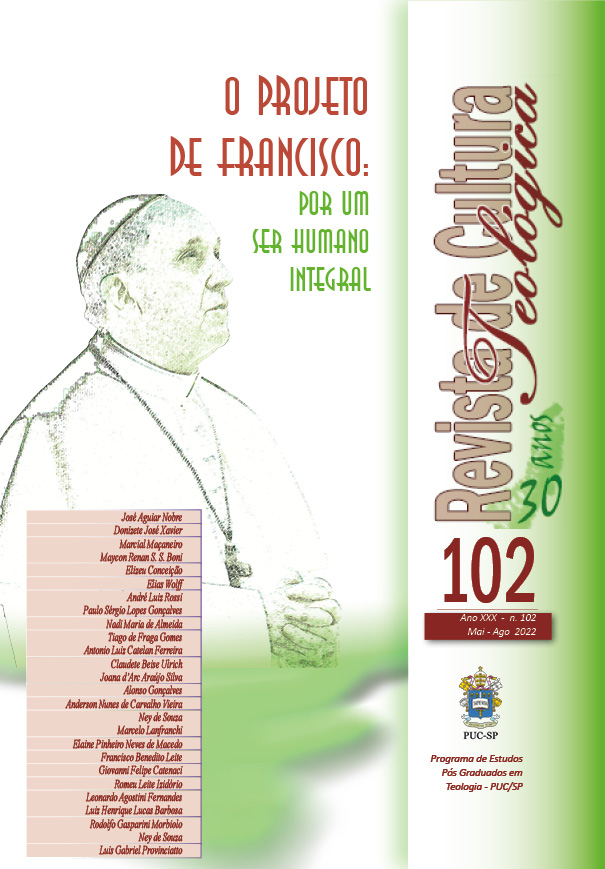Uma breve análise exegética de Nm 10,29-32
DOI:
https://doi.org/10.23925/rct.i102.58815Palavras-chave:
Livro de Números, Liderança, Marcha pelo deserto, Mediação, ParentescoResumo
O Livro de Números parece não receber a mesma atenção que os demais livros da Torá. Existem bons comentários, mas poucos artigos. Nesse sentido, um estudo sobre Nm 10,29-32 pode trazer alguma contribuição, em particular sobre o tema da súplica com promessa de recompensa que não é estranho ao livro. No texto em foco, encontra-se o diálogo entre Moisés e Hobab, na iminência da partida do Sinai rumo a Canaã. Moisés pede que Hobab sirva de guia na travessia pelo deserto. O vínculo, a denominação do sogro de Moisés e a utilidade a ele atribuída são questões relevantes e trabalhadas na análise, indagando ainda sobre a presença divina como guia pelo deserto através da Arca da Aliança e da Nuvem. Se YHWH já é o guia, por que a súplica para que um membro do clã de Raguel dos madianitas lhes direcione pelas rotas do deserto? Este artigo, adotando abordagens diacrônicas e sincrônicas, subdivide-se em tradução segmentada e notas de crítica textual, delimitação, estrutura e gênero literário, seguido de um comentário às seções adotadas. Nm 10,29-32 atesta que perícia humana não anula a condução divina, mas a integra.
Referências
ADAMCZEWSKI, Bartosz. Exodus-Numbers: A Hypertextual Commentary (V. 26). Berlim: Peter Lang, 2020.
BAILEY, Lloyd. Leviticus-Numbers. Macon: Smyth & Helwys, 2005.
Bíblia de Jerusalém, edição revista e aumentada. São Paulo: Paulus 2002.
Bíblia de Jerusalém. São Paulo: Paulinas, 1995.
Bíblia do Peregrino. São Paulo: Paulus, 2022.
BROWN, Francis; DRIVER, Samuel; BRIGGS, Charles. A Hebrew and English Lexicon of the Old Testament. Boston: Houghton and Mifflin Harcourt, 1907.
CLARK, David. Delimitation Markers in the Book of Numbers. In: KORPEL, M.; OESCH, J. (Eds.). Layout Markers in Biblical Manuscripts and Ugaritic Tablets. Assen: Koninklijke Van Gorkum, 2005. p. 1-20.
FERNANDES, Leonardo A. Jonas. São Paulo: Paulinas, 2010.
FERNANDES, Leonardo A. O êxodo da casa do sogro é prenúncio do êxodo do país opressor (Ex 4,19-23). Revista de Cultura Teológica, São Paulo, ano XXIV, n. 87, p. 117-139, jan/jun., 2016.
FERNANDES, Leonardo A.; GRENZER, Matthias. Êxodo 15,22–18,27. São Paulo: Paulinas, 2011.
GESENIUS, Wilhelm. Hebrew-Chaldee Lexicon to the Old Testament. Grand Rapids: Baker Publishing Group, 1979.
GRYLAK, Moshe. Reflexões sobre a Torá. São Paulo: Sêfer, 1988.
JOÜON, Paul; MURAOKA, Tamitsu. A Grammar of Bibical Hebrew. Roma: Editrice Pontifico Instituto Biblico, 2006.
KAUFMAN, Stephen. Targum Lexicon: a Lexicon to the Aramaic Versions of the Hebrew Scriptures from the Files of the Comprehensive Aramaic (CAL). Cincinnati: Hebrew Union College-Jewish Institute of Religion, 2004. Software Bíblico Logos. Versão 9.
KAUFMAN, Stephen. The Late Jewish Aramaic Version of the Pentateuch: from the Files of the Comprehensive Aramaic Lexicon Project (CAL). Cincinnati: Hebrew Union College-Jewish Institute of Religion, 2005. Software Bíblico Logos. Versão 9.
KNIERIM, Rolf; COATS, George. Numbers. Grand Rapids: William B. Eerdmans Publishing, 2005.
L’HEUREUX Conrad E. Números. Em: BROWN, Raymond E.; FITZMEYER, Joseph A.; MURPHY, Roland E. Novo Comentário Bíblico São Jerônimo (Antigo Testamento). São Paulo: Academia Cristã/Paulus, 2007, p. 198-221.
LEVEEN, Adriane. Memory and Tradition in the Book of Numbers. New York: Cambridge University Press, 2008.
LIENHARD, Joseph; ODEN, Thomas. (Eds.). Exodus, Leviticus, Numbers, Deuteronomy. Downers Grove: InterVasity Press, 2001.
MADALENO, Rolf. Direito de Família. Rio de Janeiro: Forense, 2020.
MAINELLI, Heleno K. Números. Em: BERGANT, Dianne – KARRIS, Robert J. (orgs.). Comentário Bíblico. São Paulo: Loyola, 1999, p. 145-185.
MILGROM, Jacob. Numbers (The JPS Torah Commentary). Filadelfia: JPS, 1990.
NGUYEN, Dinh. Numeri: Introduzione, traduzione e commento. Milano: San Paolo, 2017.
NOWELL, Irene. Numbers. Collegeville, Minnesota: Liturgical Press, 2010.
OLSON, Dennis T. Numeri. Torino: Claudiana, 2006.
PITKEANEN, Pekka. A Commentary on Numbers: Narrative, Ritual and Colonialism. New York: Routledge, 2018.
PRIOTTO, Michelangelo. Esodo. Milano: Paoline, 2014.
RYKEN, Leland. Literary Introductions to the Books of the Bible. Wheaton: Crossway, 2015.
SKA, Jean. Introduzione alla Lettura del Pentateuco: chiavi per l’interpretazione dei primi cinque libri della Bibbia. Bologna: EDB, 2002.
VARO, Francisco. Números. Bilbao: Desclée De Brouwer, 2008.
Publicado
Como Citar
Edição
Seção
Licença
Copyright (c) 2022 Revista de Cultura Teológica

Este trabalho está licenciado sob uma licença Creative Commons Attribution-NonCommercial-NoDerivatives 4.0 International License.
Os autores concedem à revista todos os direitos autorais referentes aos trabalhos publicados. Os conceitos emitidos em artigos assinados são de absoluta e exclusiva responsabilidade de seus autores.

